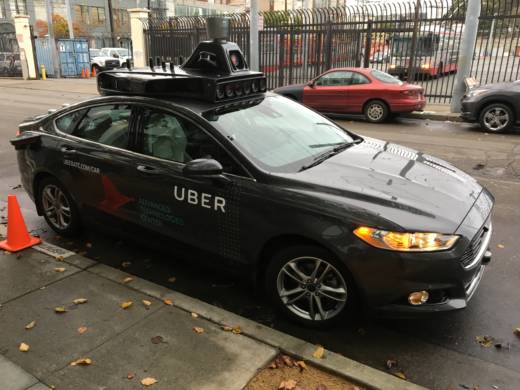Uber announced it was ending its self-driving program in San Francisco late Wednesday afternoon -- though it was not clear whether the company acted before or after the California Department of Motor Vehicles revoked registrations for 16 cars in the company's self-driving fleet.
Uber launched the San Francisco pilot without getting a DMV permit to operate autonomous vehicles on California roads. The company argued that its vehicles, which currently require an operator to be sitting in the driver's seat, don't meet the state's definition of autonomous vehicles.
Both Uber and the DMV declared Wednesday they were committed to testing autonomous vehicles on California roads, though the company had warned earlier that it was prepared to take its vehicles to jurisdictions that might have friendlier regulations.
Original post, Wednesday 5:25 p.m.: After a week of intensifying criticism for launching self-driving cars onto San Francisco streets without a state permit, Uber told the California Department of Motor Vehicles on Wednesday that it's no longer using the vehicles on public roadways.
At the same time, the DMV announced it is revoking the registration of 16 cars Uber was using in the program "because they were not properly marked as test vehicles."
In a letter released late Wednesday, DMV Director Jean Shiomoto said the DMV welcomes Uber's participation in autonomous vehicle testing and promised to expedite its application for the program.
"We are committed to assisting Uber in their efforts to innovate and advance this ground-breaking technology," Shiomoto wrote.
In its own statement, Uber said it was halting use of the self-driving cars because their registrations had been revoked.
“We’re now looking at where we can redeploy these cars but remain 100 percent committed to California and will be redoubling our efforts to develop statewide rules,” the statement said.
Wednesday's development marks a rare retreat by the world's No. 1 ride-service company, which has earned a global reputation for pushing to expand its service regardless of the niceties of local regulations.
That approach ran into a buzzsaw of criticism in San Francisco, with everyone from Mayor Ed Lee to bike and pedestrian activists decrying the company's defiance of the DMV's regulations for testing autonomous vehicles.
The condemnation only grew more intense when video surfaced of a self-driving Uber Volvo XC90 rolling through a red light outside the San Francisco Museum of Modern Art on Third Street. For its part, the San Francisco Bicycle Coalition noted that the self-driving vehicles appeared to be unable to negotiate a legal right turn when a bike lane was involved.
Lee issued a statement Wednesday evening saying he "strongly supported" the DMV's action on Uber.
"I have always been a strong supporter of innovation and autonomous vehicle development and testing, but only under conditions that put human, bicyclist and pedestrian safety first," the mayor's statement said.
Before Wednesday, the Uber had argued that since its self-driving cars require an operator to ride in the driver's seat, the vehicles don't fit the state's definition of autonomous vehicles.
